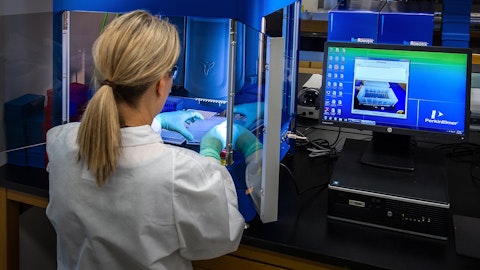In this article, we will be taking a look at the 20 biggest chemical companies in the world. To skip our detailed analysis, you can go directly to see the 5 biggest chemical companies in the world.
One of the most important industries in the world, the chemical industry is also directly integral to many other major sectors, which is why its incredible recovery after the Covid-19 pandemic seemingly subsided was great news for everyone, and especially manufacturing concerns. In fact, according to a report by BASF, one of the biggest chemical companies in the world, real change in 2021 vs the prior year was 6.1%, after a decline of 0.1% in 2020, mainly led by the European Union, where chemical production grew by 6%, and Asia, where production grew by a very healthy 7.6%. Of course, part of the contribution towards higher growth in 2021 is that the base year of 2020 was mostly stagnant while declining in some regions, especially in Japan, where the decline was 12.7% versus the prior year. Overall, the decline in 2020 was just 0.1% which makes the substantial growth rate of 2021 an even bigger achievement. While we have covered some of this information in our previous take on the top 10 chemical companies in the world in 2022, what wasn’t available at the time was BASF’s 2023 outlook, which shows that Europe will not be able to sustain its growth, which will fall by 5.2% in 2023, following a 5.8% decline in 2022, as the Russia-Ukraine war has had a disproportionate impact as rising energy costs have led to energy-intensive chemical production plummeting in the continent, and demand will continue to be driven by the automotive industry. The biggest decline in Europe is led by the United Kingdom, a country which has struggled massively and is not expected to recover in the near-term.

NEstudio/Shutterstock.com
In fact, in a response to a question about the European chemical industry, the CEO of BASF mentioned in the company’s Q4 2022 earnings call “Well, I mean, as I said earlier, I mean this understanding that the U.S. is going on OpEx and the U.S. going on OpEx and the Europe is more on CapEx. I think this is just making its way now into the minds of people who are now working on the answers. My concern is currently that we want to answer the IRA with the next regulatory packages. And I think this is not doing the job. So we have to also impact there and make people understand. I see that there is a certain nervousness in prices about what the right answer is because I think there’s also fundamental data about the growth and how much we lost now in this situation in terms of competitiveness.”
The biggest chemical market in the world right now is China, which will continue to see growth of 4% even though demand from consumer goods and electronics industries has weakened. However, this has been somewhat offset by higher demand from the automotive industry. While growth in the United States was mostly stable, coming in at 1.8% in 2021 despite a decline of 3.5% in 2020, with growth being defined by higher demand in both specialty and commodity chemicals which has allowed chemical companies to increase their prices through the year. Because of higher demand, many of the biggest chemical companies in the world have stocked up in order to build capacity, while also investing significantly to improve their capital infrastructure in a bid to enter more markets and carry out mergers and acquisitions to deliver further growth as needed.
Despite some positive key performance indicators, it is true that the chemical industry, like almost every other industry in the world, has been impacted by inflation which reached record levels in most countries. Inflation has resulted in an increase in the costs of goods sold, which in turn has deteriorated margins because of which companies have had to work hard to either reduce costs in other areas or by increasing prices, which in turn hurts demand.
Also like most industries, chemical industries are heavily focused on sustainability as ESG is now a dominant factor in concerning investment potential as evidenced by the biggest ESG companies in the world. Decarbonization is one of the most pressing requirements that will define the future of the chemical industry, because of which companies have already started to undertake research and increase their R&D costs, in a bid to lower their carbon footprint with the fight against climate change, one of the biggest global risks for 2023. The higher the level of sustainability and a company’s ESG activities, the more favorably it will be received both by customers and investors. After all, chemical companies are responsible for some of the highest levels of toxic waste in the world, and companies efforts to reduce this will have a significant impact on their perception.
As we mentioned earlier, the demand for specialty and commodity chemicals has resulted in many of the biggest chemical companies transforming their portfolios mainly due to petrochemical expansion in the U.S. Gulf Coast, while digitization is also required for these companies to remain future-proof. According to Deloitte, digital transformation is extremely necessary for to shift the landscape of the chemical industry, even though the immediate focus will be to stabilize platforms that already exist in a bid to maximize monetary benefits before expanding further to other areas. Another area of change for the chemical industry is to become more customer centric in order to retain customer loyalty and customer retention. While the Covid-19 pandemic may have accelerated this trend, the industry has already been shifting towards being more customer driven now.
To determine the biggest chemical companies in the world, we have considered both market cap and trailing twelve month revenue to rank each company with data taken from Yahoo Finance, using that to calculate the company’s average ranking. For companies which are not listed, their ranking is based on revenue alone. There are also several major companies which count among the biggest chemical companies in the world, but chemicals only make up a percentage of their total sales. For these companies, we have used either their annual reports and C&EN’s data about their chemical revenue only. We have also then used the proportion of their chemical sales to total sales to calculate their applicable market cap. So, let’s now take a look at the chemical giants of the world, starting with:
20. Braskem S.A. (NYSE:BAK)
Market cap as at 27th March 2023 (in billion): $3.0
TTM revenue (in billions): $20.3
Braskem S.A. (NYSE:BAK) is a Brazilian chemicals company which is the largest such corporation in Latin America. Braskem S.A. (NYSE:BAK) recently cited that it expects demand in petrochemicals to remain low in 2023.
19. Ineos
Market cap as at 27th March 2023 (in billion): N/A
TTM revenue (in billions): $22.4
Known for its sponsorship of a team in the Tour De France, Ineos is the biggest chemical company in the UK, while also recently appearing in the news for its bid for one of the biggest clubs in football in Manchester United plc (NYSE:MANU).
18. Formosa Plastics
Market cap as at 27th March 2023 (in billion): $19.2
TTM revenue (in billions): $8.3
Formosa Plastics is the largest chemical company in Taiwan, which has over 10,000 employees.
17. Sumitomo Chemical
Market cap as at 27th March 2023 (in billion): $5.4
TTM revenue (in billions): $22.7
Sumitomo Chemical is one of several Japanese companies in our list, and recently acquired FBSciences Holdings, a U.S. biostimulant company.
16. Mitsubishi Chemical Group
Market cap as at 27th March 2023 (in billion): $34.1
TTM revenue (in billions): $8.3
Part of the Mitsubishi conglomerate, Mitsubishi Chemical Group has faced a very hard year with the company cutting its FY22 earnings guidance even as its nine-month fiscal income nosedived 86%.
15. Hengli Petrochemical
Market cap as at 27th March 2023 (in billion): $16.5
TTM revenue (in billions): $32.0
China has a strong presence in our list of the biggest chemical companies in the world and Hengli Petrochemical is no exception, whose chairman and general manager, Fan Hongwei, recently became the richest woman in China.
14. Syngenta
Market cap as at 27th March 2023 (in billion): N/A
TTM revenue (in billions): $28.2
Syngenta is a Swiss company engaged mainly in the production of pesticides and particular seeds. The company’s looming IPO, expected to be worth around $9.4 billion, has recently been put back on hold.
13. PetroChina
Market cap as at 27th March 2023 (in billion): $12.5
TTM revenue (in billions): $39.7
PetroChina is the biggest oil and gas producer in Asia, and one of the largest companies in the world by revenue, with chemicals contributing around 20% of the company’s revenue. In 2022, the company launched a project worth $4.5 billion to expand a refinery into a petrochemicals complex.
12. Reliance Industries
Market cap as at 27th March 2023 (in billion): $13.1
TTM revenue (in billions): $22.6
Reliance Industries is the biggest company in India, with its overall revenue in excess of $106 billion. Engaged in several different industries, its presence in the chemical industry is significant as well, with the company announcing in $2022 a 5 year plan of $9.4 billion to expand its oil to chemicals business.
11. Shin-Etsu Chemical
Market cap as at 27th March 2023 (in billion): $64.3
TTM revenue (in billions): $20.9
One of the largest chemical companies in the world, Shin-Etsu Chemical is a Japanese company which is said to have the higher market share in the world in polyvinyl chloride, photomask substrates and semiconductor silicones.
10. Wanhua
Market cap as at 27th March 2023 (in billion): $43.3
TTM revenue (in billions): $24.1
One of the largest chemical companies in China, Wanhua is involved in the supply of innovative chemical products. It is expected to start production at its recent $2.7 billion plant in 2024.
9. Exxon Mobil Corporation (NYSE:XOM)
Market cap as at 27th March 2023 (in billion): $26.3
TTM revenue (in billions): $41.3
Among the biggest oil companies in the world, Exxon Mobil Corporation (NYSE:XOM) has made a significant foray into the chemicals industry, which is one of its biggest segments. Exxon Mobil Corporation (NYSE:XOM) is involved in the production of polymer and petrochemical products.
8. Sinopec
Market cap as at 27th March 2023 (in billion): $3.0
TTM revenue (in billions): $20.3
One of the largest companies in the world by revenue, Sinopec may be a predominantly oil and gas company but is still a major player in the chemical industry.
7. LyondellBasell Industries N.V. (NYSE:LYB)
Market cap as at 27th March 2023 (in billion): $28.8
TTM revenue (in billions): $50.5
LyondellBasell Industries N.V. (NYSE:LYB) is the largest chemical company in the Netherlands, while its U.S. operations are headquartered in Texas. LyondellBasell Industries N.V. (NYSE:LYB) is the biggest licensor of polypropylene and polyethylene.
6. LG Chem
Market cap as at 27th March 2023 (in billion): $39.5
TTM revenue (in billions): $39.9.
Part of the LG Corporation conglomerate, LG Chem is one of the biggest chemical companies in the world and the biggest in South Korea. While it operated initially as a consumer business, it has pivoted since and is now fully a business-to-business company.
Click to continue reading and see the 5 biggest chemical companies in the world.
Suggested articles:
- 15 Best Retirement Communities For Active Adults
- 25 Countries with the Best Hospitals in the World
- 12 Best Consumer Cyclical Dividend Stocks To Buy Now
Disclosure: None. 20 biggest chemical companies in the world is originally published at Insider Monkey.





